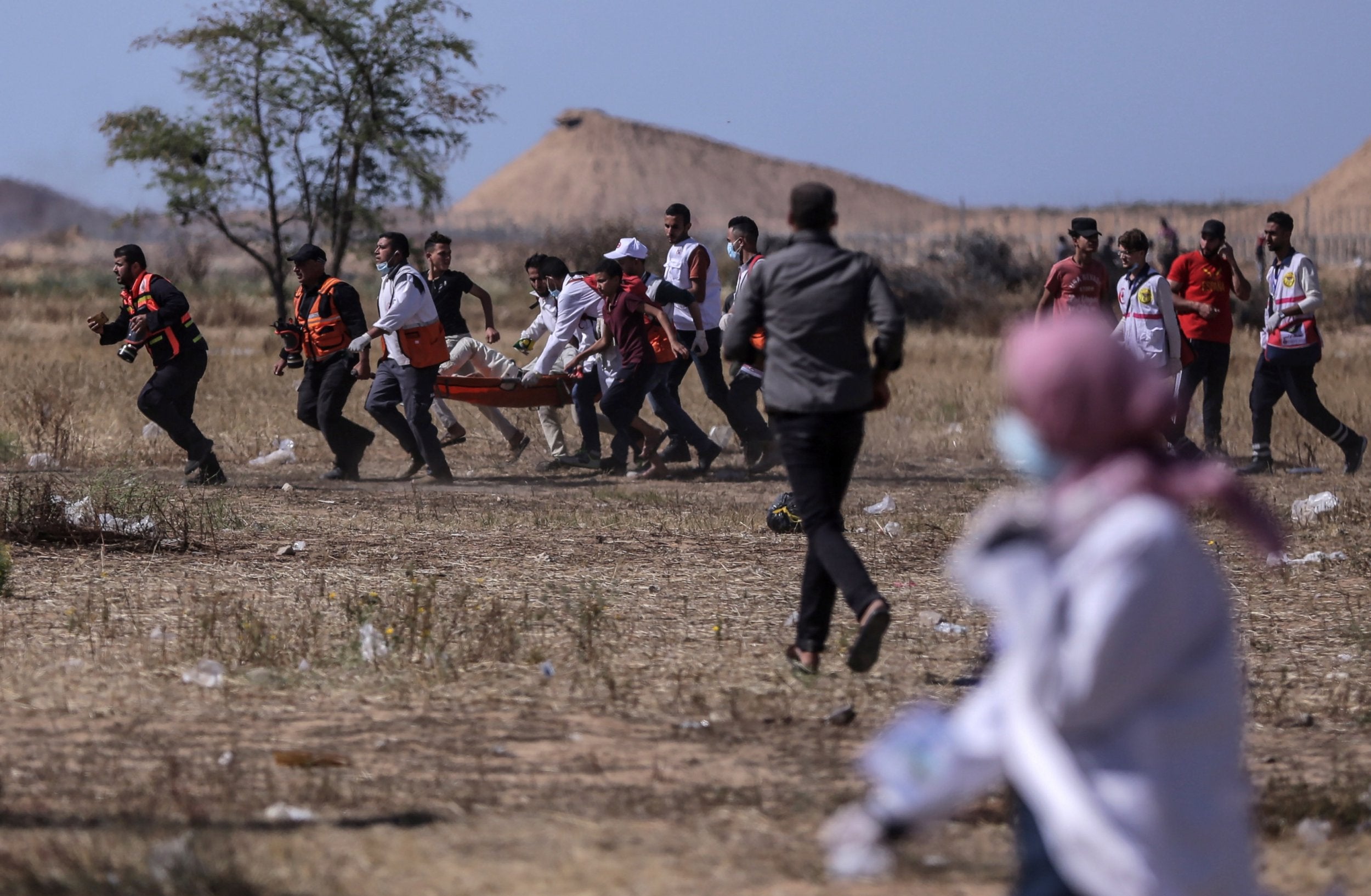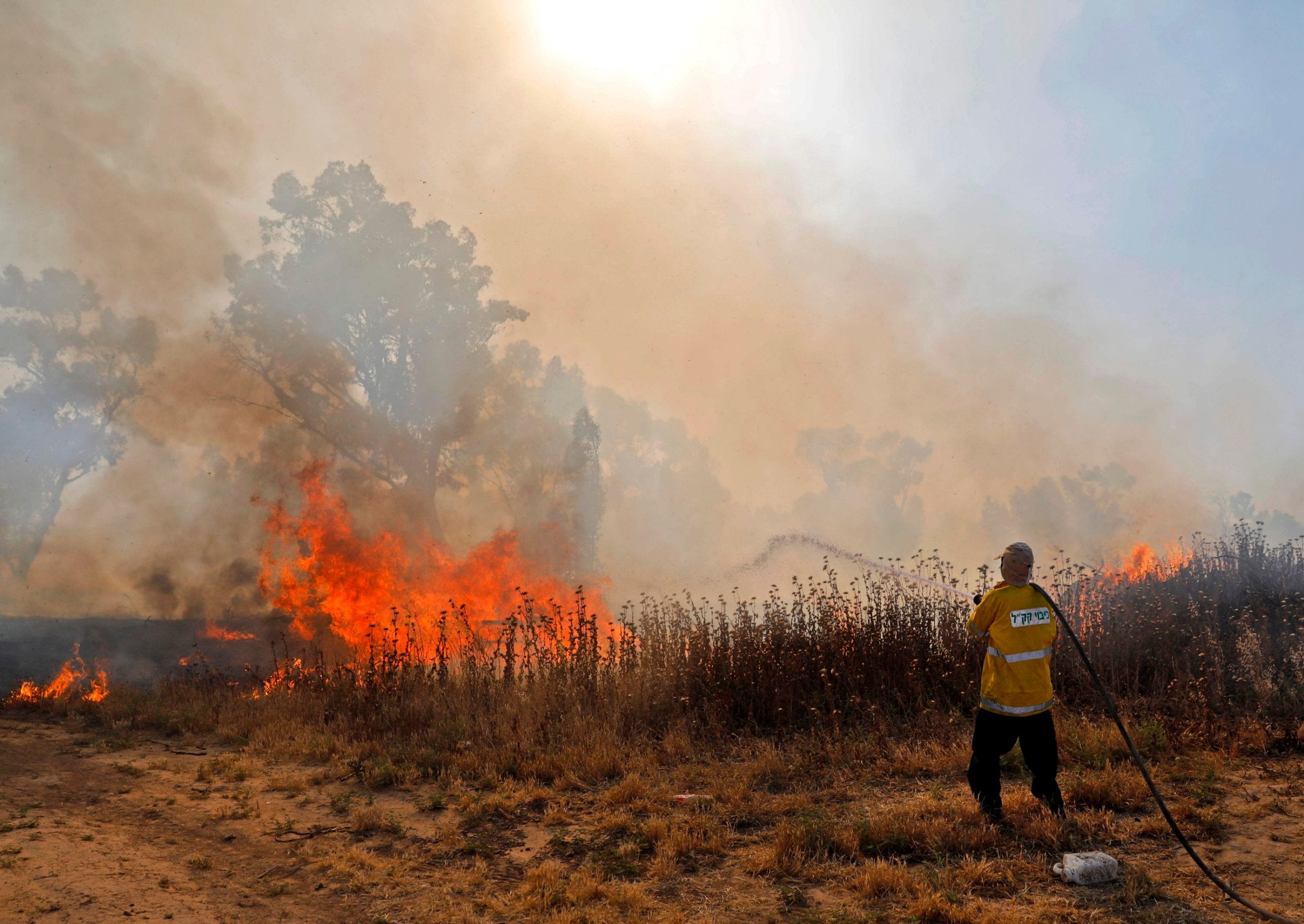Your support helps us to tell the story
From reproductive rights to climate change to Big Tech, The Independent is on the ground when the story is developing. Whether it's investigating the financials of Elon Musk's pro-Trump PAC or producing our latest documentary, 'The A Word', which shines a light on the American women fighting for reproductive rights, we know how important it is to parse out the facts from the messaging.
At such a critical moment in US history, we need reporters on the ground. Your donation allows us to keep sending journalists to speak to both sides of the story.
The Independent is trusted by Americans across the entire political spectrum. And unlike many other quality news outlets, we choose not to lock Americans out of our reporting and analysis with paywalls. We believe quality journalism should be available to everyone, paid for by those who can afford it.
Your support makes all the difference.Hamas officials said they ordered protesters away from border fences and urged restraint on the annual commemoration of Nakba Day (“Day of the Catastrophe”), to protect a tense truce with Israel that is hosting thousands of foreigners for the Eurovision Song Contest.
At least 10,000 Palestinian people gathered at various points along the flashpoint border regions for the anniversary of when at least 700,000 were expelled or fled their homes during the 1948 war which surrounded the creation of Israel.
Last year Israeli forces killed 60 Palestinians at similar rallies, which also coincided with President Donald Trump’s controversial decision to move the US embassy from Tel Aviv to Jerusalem, thereby recognising the contested city as Israel’s capital.
Just two weeks ago, Israel and Gaza teetered on the brink of war after militants in the Strip fired 700 rockets at Israel, which responded by pounding some 350 targets in Gaza.
Egypt brokered a fragile ceasefire, just ahead of the start of Eurovision in Tel Aviv amid fears a war would threatened thousands of foreign visitors flying into Tel Aviv for the competition.
On Wednesday in Gaza small clashes erupted along the fortified wall, leaving 65 injured, including 16 with gunshot wounds. However most avoided approaching the fence.
Hazem Qassem, a spokesman for Hamas, the militant group that runs the Strip, told The Independent that they wanted to stop any actions that could threaten the Egyptian-brokered ceasefire “as long as the Israelis respected it”.
“Today we asked people to stay in a safe area, away from the fence, and not to do anything provocative – security officers were scattered around to ensure this,” he said beside the border protests.
“This has no relation to Eurovision for us, but we are concerned about the safety and security of our civilians right now,” he added.
Bassem Naim, a senior Hamas figure, told AFP at the same protest site east of Gaza City that the “truce understandings played a role in controlling the demonstrations” on Wednesday.
A fire broke out on the Israeli side after kites with firebombs attached to them were launched over the border – but otherwise the quiet held.

Nearly 300 Palestinians have been killed by Israeli fire since regular protests began in March 2018.
Six Israelis have been killed in Gaza-related violence over the same time period.
There were fears that this year’s Nakba protests would see another surge in violence.
At Wednesday’s protests, most were too young to remember 1948 but one elderly man, who was was a young boy at that time, recounted the sudden flood of people fleeing the fighting.
He said his family had agricultural land just south of Ashkelon.
“I remember all these people, scared and terrified, thinking they were just leaving their homes for a little bit,” Hamdy Matar, 80, told The Independent from a protest tent set up back from the border with Israel.
“After a while many attempted to go back home to pick up their belongings but were killed.
“My father was killed trying to go back to harvest his vegetables, and so we have never been back to our lands,” he added.
Despite needing to move in a wheelchair or crutches Mr Matar said he joined every one of the regular protests which have been held every week.
“I come here every Friday, because I would like to go home before I die. Right now, under blockade living in Gaza is the worst,” he said.
Sitting behind him Abu Khalil, 71, said he was just four months old when his family fled a similar area between Erez, which is now the border with Gaza, and Ashkelon.

“We lived in these mud-brick houses at first before we finally went to a beach [refugee] camp, where we have lived ever since,” he said.
“My father told me the story about our home, which I pass on to my children, and this is what these protests are doing – preserving that memory,” he added.
To mark Nakba in the West Bank, protesters in the city of Ramallah held up giant paper keys to symbolise the keys to their homes they were expelled from or were forced to abandon, now located inside Israel.
Israel’s military said in a statement that around 10,000 “rioters and demonstrators” were along the Gaza fence, and that some were “setting tyres on fire and hurling rocks”.
“A number of explosive devices have been hurled within the Gaza Strip as well, and a number of attempts have been made to approach the security fence.”
The statement said its troops were responding with “riot-dispersal means”.

Join our commenting forum
Join thought-provoking conversations, follow other Independent readers and see their replies
Comments